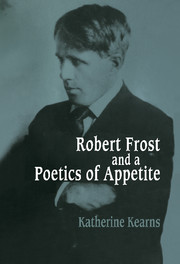Book contents
- Frontmatter
- Contents
- Acknowledgments
- Introduction: The Serpent's Tail
- 1 Irony: Teiresias's Gaze
- 2 Irony II: This Is Not a Pipe
- 3 Women: Dryads, Witches, and Hill Wives
- 4 Eros: The Mischief Maker
- 5 Prosody: White Noise
- 6 Lyricism: At the Back of the North Wind
- Conclusion: Out Far and in Deep
- Notes
- Index
- CAMBRIDGE STUDIES IN AMERICAN LITERATURE AND CULTURE
2 - Irony II: This Is Not a Pipe
Published online by Cambridge University Press: 19 March 2010
- Frontmatter
- Contents
- Acknowledgments
- Introduction: The Serpent's Tail
- 1 Irony: Teiresias's Gaze
- 2 Irony II: This Is Not a Pipe
- 3 Women: Dryads, Witches, and Hill Wives
- 4 Eros: The Mischief Maker
- 5 Prosody: White Noise
- 6 Lyricism: At the Back of the North Wind
- Conclusion: Out Far and in Deep
- Notes
- Index
- CAMBRIDGE STUDIES IN AMERICAN LITERATURE AND CULTURE
Summary
Poetry provides the one permissible way of saying one thing and meaning another.
Robert Frost, Prose 36Keeper. If I were in your place, though, Mr. Prophet,
I'd want to be more certain I was called,
Before I undertook so delicate
A mission as to have to tell New York
'Twas in for an old-fashioned shaking down
Like the one Joshua gave Jericho.
You wouldn't want the night clubs laughing at you.
Jesse Bel. Or The New Yorker.
Robert Frost, “A Masque of Mercy”At any given moment within the poetry, Frost may be felt to invite conflicting assumptions about his significance and his intent, and although he may articulate his habit of creating oppositional values of “spirit and matter, good and evil, monism (cohesion) and dualism (reaction), peace and strife,” in ecstatic transcendental terms of “unity,” there is within his ironic mode a sense of darkness that does not derive from Emerson and Thoreau. Reified in his deconstructing homesteads, his cracked baptismal font, and his broken chalice, all of which are just before being swallowed by the hungry, encroaching trees, his poetic vision peers into a place that defies systematization. And he is well aware of the implications of his choice to situate himself as he does; resonating between justice and mercy, he does not expect a safe middle ground, for the two simply do not breed some neutered “third thing” for one to live upon.
- Type
- Chapter
- Information
- Robert Frost and a Poetics of Appetite , pp. 56 - 85Publisher: Cambridge University PressPrint publication year: 1994

